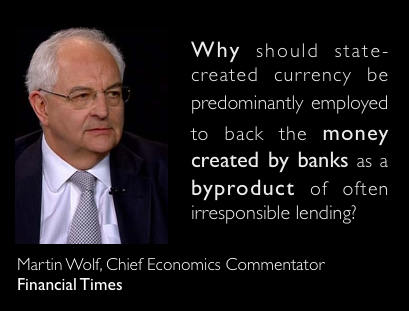Financial Times: False Beliefs on Helicopter Money


This is big news in the UK mainstream media! The Chief economics commentator for Financial Times has written an article on 12th February 2013 entitled “The case for helicopter money”, in which he debunks some of the myths about banking and monetary policy that we have been talking about since 2010.
Here is a short extract:
“Some are sure that the troubled western economies suffer from a surfeit of money. Meanwhile, orthodox policy makers believe that the right way to revive economies is by forcing private spending back up. Almost everybody agrees that monetary financing of governments is lethal. These beliefs are all false.”
Martin Wolf shows in this article how the money supply in UK as well as in US has shrunk since the beginning of the financial crisis, highlighting that we are suffering from having too little, rather than too much, money.
He debunks the myth that banks expand their lending in direct response to their holdings of reserves at the central bank – one of the misconceptions that we explained in our Banking 101 Video Course in Part 4 “How much money can banks create”. Furthermore, he writes about the supply of reserves being potentially infinite; that the central banks in practice advance unlimited reserves to a bank; and that bank lending does NOT respond to changes in interest rates set by central banks.
He strongly endorses Adair Turner’s recent policy prescription.
He also mentions a working paper from the International Monetary Fund entitled “The Chicago Plan Revisited”.
The Positive Money proposals are often mentioned alongside the Chicago plan. While they do indeed have the same goal, that is: to stop banks creating money in the process of making loans (or buying assets), they have some significant differences. Read more here.
(You need to register at FT to be able to read their articles.)